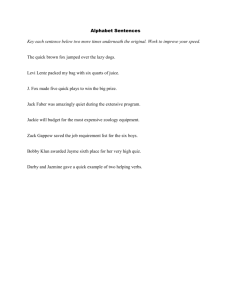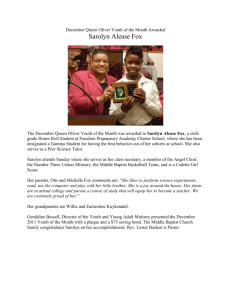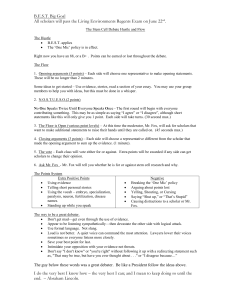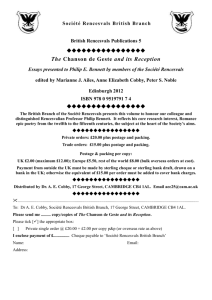January 10, 2010 A Fox Chief at the Pinnacle of Media and Politics
advertisement
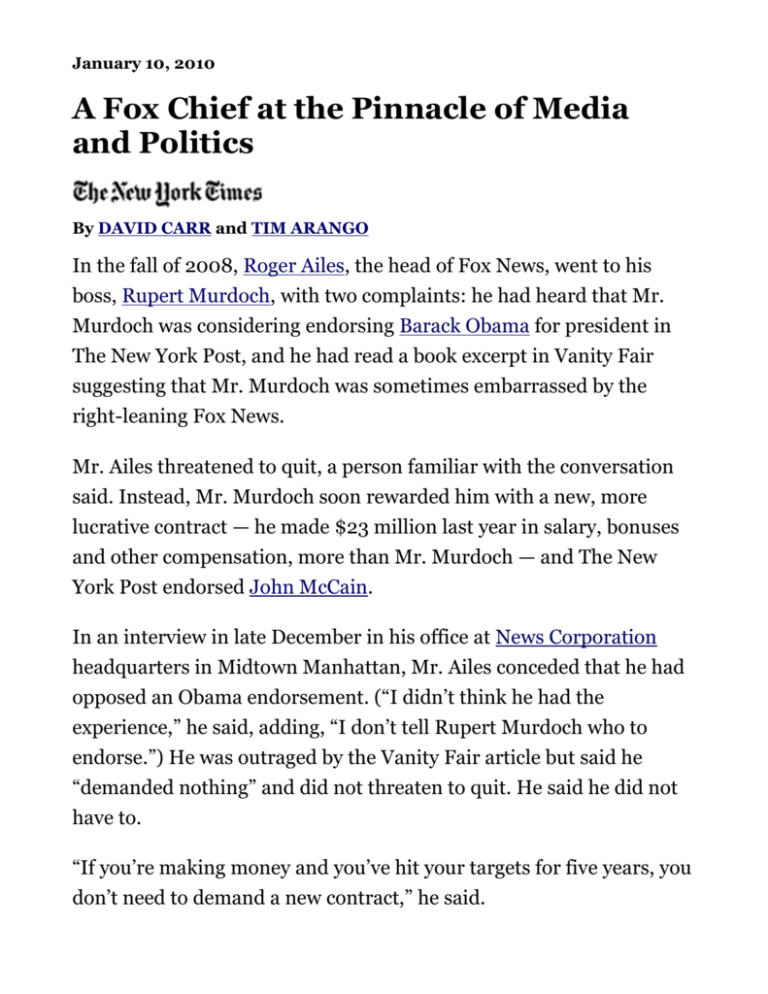
January 10, 2010 A Fox Chief at the Pinnacle of Media and Politics By DAVID CARR and TIM ARANGO In the fall of 2008, Roger Ailes, the head of Fox News, went to his boss, Rupert Murdoch, with two complaints: he had heard that Mr. Murdoch was considering endorsing Barack Obama for president in The New York Post, and he had read a book excerpt in Vanity Fair suggesting that Mr. Murdoch was sometimes embarrassed by the right-leaning Fox News. Mr. Ailes threatened to quit, a person familiar with the conversation said. Instead, Mr. Murdoch soon rewarded him with a new, more lucrative contract — he made $23 million last year in salary, bonuses and other compensation, more than Mr. Murdoch — and The New York Post endorsed John McCain. In an interview in late December in his office at News Corporation headquarters in Midtown Manhattan, Mr. Ailes conceded that he had opposed an Obama endorsement. (“I didn’t think he had the experience,” he said, adding, “I don’t tell Rupert Murdoch who to endorse.”) He was outraged by the Vanity Fair article but said he “demanded nothing” and did not threaten to quit. He said he did not have to. “If you’re making money and you’ve hit your targets for five years, you don’t need to demand a new contract,” he said. Mr. Ailes is certainly making money. At a time when the broadcast networks are struggling with diminishing audiences and profits in news, he has built Fox News into the profit engine of the News Corporation. Fox News is believed to make more money than CNN, MSNBC and the evening newscasts of NBC, ABC and CBS combined. The division is on track to achieve $700 million in operating profit this year, according to analyst estimates that Mr. Ailes does not dispute. This outsize success has placed Mr. Ailes, an aggressive former Republican political strategist, at the pinnacle of power in three corridors of American life: business, media and politics. In addition to being the best-paid person in the News Corporation last year, he is the most successful news executive of the last 10 years, and his network exerts a strong influence on the fractured conservative movement. Mr. Obama told The New York Times Magazine in October 2008 that the “Fox effect” had cost him two to three points in the polls. Since that election, Mr. Ailes and his cohort of conservative anchors like Glenn Beck, Bill O’Reilly and Sean Hannity have been riding a wave of discontent that sometimes puts them at odds with the Republican Party’s establishment, most recently with Fox News’s advocacy of an independent candidate in the 23rd Congressional District in upstate New York. The Republican candidate eventually withdrew. “When you think about that, it’s the equivalent of the endorsement major newspapers used to provide,” said David Gergen, an analyst on CNN who has been an aide in Democratic and Republican administrations. He went on: “Regardless of whether you like what he is doing, Roger Ailes is one of the most creative talents of his generation. He has built a media empire that is capable of driving the conversation, and, at times, the political process.” Mr. Murdoch, in a statement relayed by a spokesman, said: “I’m proud of Fox News and what it is accomplishing, and I am grateful to Roger and his team for creating such a great asset for News Corporation.” Mr. Ailes’s approach has put him at odds not just with the Democrats but also with the more liberal members of his boss’s family. He played a well-chronicled role in the decision in 2004 by Lachlan Murdoch, Mr. Murdoch’s eldest son, to leave the company; he thought Mr. Ailes was intruding on his corporate turf. Two other Murdoch children, Elisabeth, a television producer in London, and James, the only Murdoch scion employed at the company, are sympathetic to Democratic causes and frequently voiced concerns to their father during last year’s presidential campaign about Fox News’s coverage of Mr. Obama. And those concerns have only grown. “I am by no means alone within the family or the company in being ashamed and sickened by Roger Ailes’s horrendous and sustained disregard of the journalistic standards that News Corporation, its founder and every other global media business aspires to,” said Matthew Freud, who is married to Ms. Murdoch and whom PR Week magazine says is the most influential public relations executive in London. In the interview, Mr. Ailes said that both Mr. Murdoch and the News Corporation had been consistently supportive of Fox News and its approach. Mr. Ailes, the son of a foreman at the Packard Electric plant in Warren, Ohio, described his upbringing with three words: “God, country, family” and said that credo was responsible for the success of Fox News. “I built this channel from my life experience,” Mr. Ailes, 69, said. “My first qualification is I didn’t go to Columbia Journalism School. There are no parties in this town that I want to go to.” Mr. Ailes majored in radio and television at Ohio University and worked for “The Mike Douglas Show,” where at age 27 he met thenpresidential candidate Richard M. Nixon in 1968. “The camera doesn’t like you,” he told Mr. Nixon, according to “Crazy Like a Fox,” a book by Scott Collins about Fox News. “It’s a shame a man has to use gimmicks like this to get elected,” Mr. Nixon said. “Television is not a gimmick, and if you think it is, you’ll lose again,” Mr. Ailes said. The Nixon campaign hired him a few days later. The night in 1969 when Neil Armstrong walked on the moon, Mr. Ailes was inside the Oval Office setting up a screen on the president’s desk. The next year, Mr. Ailes was sent to Hawaii in advance of the attempt by the troubled Apollo 13 mission to return to earth. He prepared for two events in adjacent hangars: a funeral and a welcome home ceremony. Apollo 13 made it home safely. Joe McGinniss, who wrote about Mr. Ailes in his 1969 book, “The Selling of the President 1968,” keeps in touch with him. “Success never made that chip on his shoulder go away,” Mr. McGinniss said. “He holds onto what he envisions to be the values of the heartland and is suspicious of people on either coast.” After serving as a communications consultant for politicians and executives, Mr. Ailes ran CNBC, the business network, in the early 1990s under Bob Wright, then the chief of NBC. “He’s got a very good sense of simplicity on air,” Mr. Wright said. “Because he had that background of being involved in political campaigns, he could develop a message and deliver it, and test it quickly to see if it’s effective.” Mr. Ailes started Fox News in 1996 and faced skepticism that it ever could be a rival to CNN, much less the ratings and profits leader it is today. As recently as 2002, the network made very little money, said Michael Nathanson, an analyst at Sanford C. Bernstein & Company. Today, its vast profits secured by ever-rising fees from cable companies make it “probably the single most important asset at News Corporation,” he said. “I built this business to throw off a billion dollars in profit,” Mr. Ailes said. “That was the goal from Day 1. In my own mind.” Rick Perlstein, author of “Nixonland,” sees a strong resemblance between Mr. Ailes’s political experience and his approach to television. “Like Richard Nixon, like Spiro Agnew, Fox News can never see itself as the attacker,” he said. “They are always playing defense because they believe they are always under attack, which attracts people that have the same personality formation. By bringing that mind-set, plus the high energy seamless stream of the aggression of talk radio, he has found an audience.” Not all of Mr. Ailes’s political interests are national in scope. In 2002, after buying a weekend home in Putnam County, N.Y., an area rich in American history (a passion of Mr. Ailes’s) about 60 miles north of Manhattan, he became keenly interested in local issues. In 2008, he bought two local newspapers and installed his wife, Elizabeth, as publisher of both. He also has a young son. There, he has engaged in a more direct version of politics. He is extremely concerned about zoning, among other local issues. At a town hall forum on Oct. 26 sponsored by one of his newspapers, he had a heated exchange with Richard Shea, a Democratic councilman who was running for town supervisor. “I turn around, and there he is,” said Mr. Shea, who won the election. “He starts right in on the zoning. He says, ‘What are you trying to hide from me in the zoning?’ He said, ‘I own the newspaper.’ ” Mr. Shea continued, “My takeaway was that this guy is pretty much threatening me.” Mr. Ailes said he simply asked for Mr. Shea’s phone number and complained about “environmental zealots” in the town. “I am a conservationist,” he said. “I try to put the bottle in the right can.” As powerful as he is within the News Corporation, Mr. Ailes remains a spectral presence outside the Fox News offices. National security had long been a preoccupation of Fox News, and it was clear in the interview that the 9/11 attacks had a profound effect on Mr. Ailes. They convinced him that he and his network could be terrorist targets. On the day of the attacks, Mr. Ailes asked his chief engineer the minimum number of workers needed to keep the channel on the air. The answer: 42. “I am one of them,” he said. “I’ve got a bad leg, I’m a little overweight, so I can’t run fast, but I will fight. “We had 3,000 dead people a couple miles from here. I knew that any communications company could be a target.” His movements now are shadowed by a phalanx of corporateprovided security. He travels to and from work in a miniature convoy of two sport utility vehicles. A camera on his desk displays the comings and goings outside his office, where he usually keeps the blinds drawn. Mr. Ailes said he received frequent threats over the years, but his concerns for the safety of his family were heightened by an incident at his New Jersey home after the 9/11 attacks. There was an intruder on his property, but no arrest was made. In Putnam County, he has bought several properties surrounding his home. A sign outside his house shows an illustration of a gun and advises visitors that it is under video surveillance. After 9/11, Mr. Ailes sent a memo to President George W. Bush urging harsh action. Despite the influence Fox News has over many Republicans — the megaphone of Fox News is a valuable one for Republican politicians — he is generally not eager to be seen as having any relationship with the party. His influence in politics is onceremoved, expressed through the talent he chooses and the tone he sets. In a sense, trading intelligence with party officials would be a step down for Mr. Ailes. “He understands the news media, politics and the American people as well as anyone in the modern age,” said Newt Gingrich, the former speaker of the House. Even Mr. Ailes’s political foes understand the influence of what he has built at Fox News. “If he were a Democrat, I think there would be 67 Democratic senators right now,” said the political consultant James Carville, a former Clinton aide and a frequent guest on CNN. “In terms of the news business, the cable television business, and the political business, there is him and then there is everybody else.”

